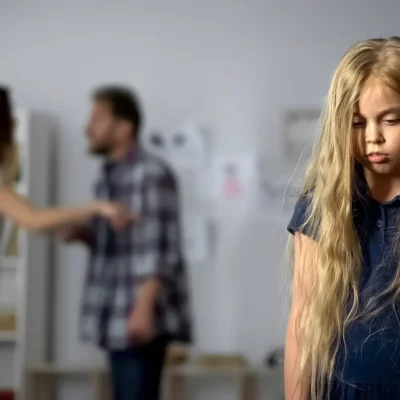Childhood is ideally a time of joy, learning, and innocence. For many, it carries the heavy burden of traumatic or abusive experiences. Whether you’ve recently awakened to your past experiences or you’ve known about your past and want to unravel the effects of your early trauma, this post can help you understand how your experiences with abuse and trauma are hindering your adulthood.
This article will cover what trauma looks like, how unprocessed trauma can affect you, how trauma can lead to self-sabotage, a short quiz to determine if your childhood trauma is holding you back in life, and how to cope with your experiences to live a more fulfilling, happy life.
What does childhood trauma look like?
Childhood trauma is the experience of intensely stressful events that shatter your sense of security, making you feel helpless and vulnerable in a world that should provide safety. It casts long shadows into adulthood, often shaping personality and behavior in intricate ways.
Different forms of childhood trauma include:
- Emotional abuse: This includes consistent belittling, shaming, and humiliating you.
- Physical abuse: Any form of physical harm intentionally inflicted on you.
- Sexual abuse: An adult using a child for sexual purposes.
- Neglect: Failure of a parental figure to meet your basic needs, including housing, food, clothing, education, and access to medical care.
- Witnessing violence: Seeing acts of violence or living in violent environments.
No form of abuse is more or less abusive than another. Each form of abuse holds specific importance in the development of your brain and, in turn, causes your worldview to change.
For example, you may feel that if you experienced emotional abuse, it isn’t as bad as experiencing physical abuse. Because of this belief, you may downplay the abuse and the effects the abuse has caused you. Both forms of abuse can cause long-lasting effects if not treated and processed. Know that any kind of abuse is not ok and worthy of seeking help.
When most talk about childhood trauma, it is assumed that the trauma happens due to parental abuse. There is another aspect of childhood trauma that needs to be discussed: environmental trauma. This can include natural disasters, losing a parent or friend, being bullied or socially isolated in school, and being part of the foster care system.
With this in mind, let’s look at some examples of abuse and environmental trauma.
Examples of childhood trauma include:
- Seeing domestic violence in your home.
- Experiencing food insecurity.
- Being emotionally manipulated, shamed, or humiliated by a parent.
- Witnessing a tragedy like a car accident, house fire, or death.
- Being beaten, hit, slapped, or experiencing other severe forms of physical harm.
- Experiencing the loss of a parent or loved one.
- Living through a flood, tornado, shooting, or a terrorist attack.
- Experiencing unpredictable parental behaviors and mood swings due to substance abuse or mental health issues.
- Constantly moving and not having a stable home.
This list is just a snapshot of examples you may have experienced as a child. Remember that abusive behaviors or traumatizing events can be subtle, as well. No matter what you have experienced, know that your feelings are valid, and you deserve to be free from the harm of past events.
Consequences of unprocessed childhood trauma
The repercussions of unaddressed childhood trauma can affect numerous aspects of your life.
Next, let’s look at the different ways unprocessed traumatic events can have on you from childhood to adulthood.
Mental health issues from unprocessed trauma include:
- Anxiety
- Depression
- Post-Traumatic Stress Disorder (PTSD)
- Substance abuse
Insecurities and emotional struggles from unprocessed trauma include:
- Low self-esteem
- Difficulty trusting others
- Unexplained feelings of shame and guilt
- Persistent fear and feelings of being unsafe
The lasting effects of unprocessed trauma can cause some distress well into adulthood. Looking at these thoughts and feelings, you can see how they affect how you see yourself and other areas like relationships, career, and achieving your goals.

How childhood trauma causes self-sabotage
Unprocessed childhood trauma can become the blueprint for adult behaviors, often in the form of self-sabotage.
What is self-sabotage?
Self-sabotage is any action or thought that keeps you from achieving your goals and living a fulfilling life. It can take many forms, including:
- Negative self-talk
- Procrastination
- Avoiding opportunities for growth and success
- Engaging in harmful behaviors like drug use, excessive drinking, or unhealthy eating habits
Childhood trauma can lead to self-sabotaging behaviors as a way to cope with intense emotions and feelings of insecurity. It can also stem from a deep-rooted belief that you are not worthy or deserving of happiness and success due to past experiences.
Examples of self-sabotage in adults with trauma include:
- Not applying for your dream job because you don’t believe you are qualified.
- Sabotaging a romantic relationship because of fear of abandonment or intimacy issues
- Avoiding seeking help for mental health struggles due to stigma or feelings of shame and guilt
- Engaging in risky behaviors as a way to numb emotional pain
- Choosing partners who display abusive behaviors because you believe they are the only ones who could love you perpetuates the cycle of abuse.
Recognizing these patterns is the first step towards breaking the cycle and carving a path toward a life you envision for yourself.

Short Quiz: Is childhood trauma holding you back?
It’s challenging to confront the possibility that your childhood experiences may affect your present. Ask yourself these questions to begin that introspective journey:
- Do you find yourself repeating patterns that prevent personal or professional growth?
- Are your relationships often tumultuous or unfulfilling?
- Do you struggle with self-care and setting healthy boundaries?
- Is there a persistent sense of fear or unworthiness that you can’t explain?
- Do you often avoid opportunities or social interactions due to intense anxiety or a lack of trust?
These questions aim to reflect on behaviors and emotions that may arise from unresolved trauma. If you answered yes to any of these questions, finding guidance from a specialized trauma therapist can be imperative to resolving your past experiences and working through the emotions that keep you stuck at the time of abuse.
Think of it this way: As a child, you are a learning machine. Everything you feel, see, taste, touch, and listen to is absorbed by your brain like a sponge. Your experiences are programming your brain to understand the world around you.
If, during your childhood, you experienced abuse, a traumatic event, or consistent distress, your programming will reflect your experiences. Even if the traumatic event or abuse is far from you as an adult, you hold tight to the messages that were received at the time of the traumatic event.
For example, if your parent made you feel like your voice wasn’t worth hearing as a child, you may still believe that no one wants to listen to what you have to say, even in your 30s or 40s. Regardless of it being a false belief, you still believe it because it is what you know from your past experiences.
Makin Wellness online trauma therapy and coping skills can help you untangle the mixed messages you carry to create a healthy self-image and worldview.

How to cope with childhood trauma
Coping with childhood trauma is a nuanced process unique to you. Certain practices can serve as general guidelines for beginning the journey to overcoming your trauma.
- Online therapy: Working with a specialized Makin Wellness therapist can provide the safe space needed to process your trauma experience and find healthy ways to move forward.
- Mindfulness and meditation: These practices can help ground you in the present and alleviate stress.
- Expressive writing: Journaling or creative writing can be cathartic and help process feelings that can be difficult to say out loud.
- Support groups: Connecting with others with similar experiences can foster understanding and help you feel less alone with the feelings you are experiencing.
Because trauma is layered and complex, it is imperative to include online therapy in your coping strategies. A Makin Wellness therapist can offer support, delving into areas such as repressed memories and helping you establish a secure environment for healing. They’re trained to ask probing questions that bring hidden wounds to light, facilitating a path to rediscover and reclaim the parts of yourself that may have been lost or obscured by trauma.
Conclusion
Childhood trauma can affect every corner of your adult life, from self-perception to how you interact with the world, from relationships to your professional career. If you recognize the echoes of past traumas in your present life, know that there is help available to guide you through understanding your experiences, coping with areas that are difficult for you, and who will create the safe space you need to unravel the knot inside you that is childhood trauma.
Makin Wellness offers specialized therapists attuned to the sensitivities of childhood trauma. If you are ready to start your online therapy journey, call (833)-274-heal or schedule an appointment to connect with a compassionate professional dedicated to helping you move from merely surviving to truly thriving.








